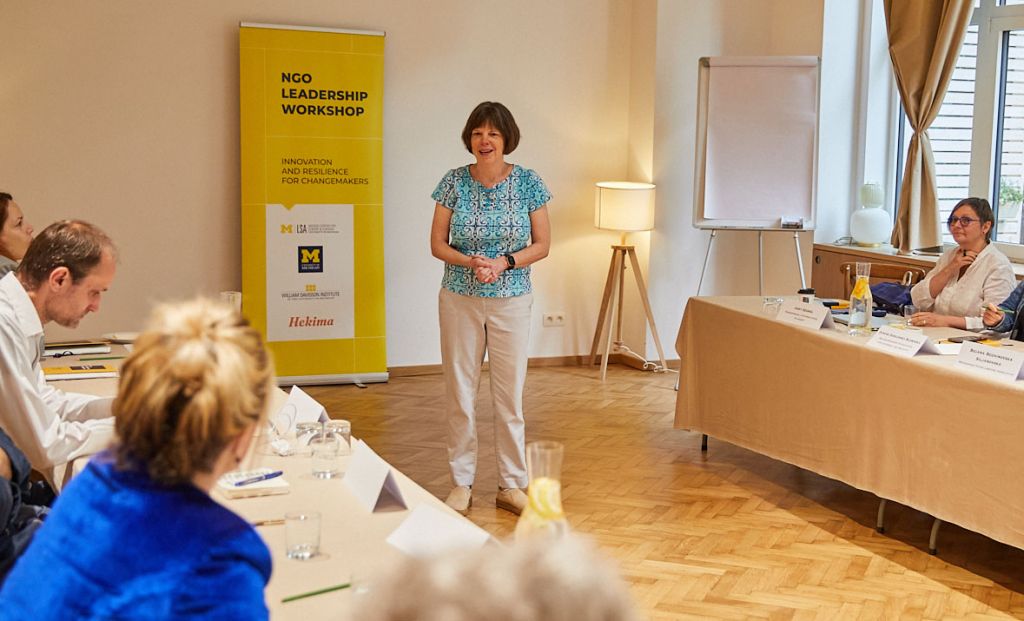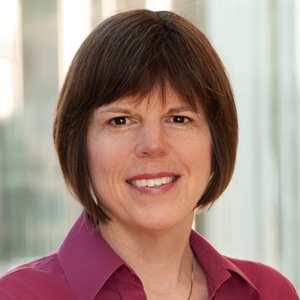Perspective: Leadership Development in Uncertain Times
Thursday, August 7, 2025
Education
Above: Participants in the May 2025 NGO leadership workshop in Slovakia.
“For Ukrainians it is very important to remind ourselves that there is still calmness in the world, and to have the opportunity to study in such a calm situation, it is very, very valuable for me,” said Yevheniia Stadnik, of the Centre for Democracy and the Rule of Law.
Stadnik was one of 25 participants in the NGO Leadership Workshop last year, all of whom work for nonprofit organizations in Ukraine. Sadly, Russia’s war in Ukraine goes on. So must our commitment to leadership development. This summer at WDI we marked two ground-breaking anniversaries: the 10th anniversary of the NGO Leadership Workshops and the 19th anniversary of our flagship professional education program.
WDI, along with the Weiser Center for Europe & Eurasia (WCEE), launched the NGO Leadership Workshop to equip civil society leaders in Central and Eastern Europe and neighboring regions with the management and leadership skills they often lacked, but desperately needed. Many NGOs were mission-driven but struggled with sustainability, strategic planning and management. The workshop responded to this by providing a space for leaders just like Stadnik to learn, reflect and connect.
Now, ten years and more than 350 participants later, its importance has only grown. The region is facing renewed challenges—shrinking civic space, political polarization, and new funding uncertainties. Meanwhile, NGO leaders are being called upon to do more with fewer resources, to collaborate across borders, and to measure impact rigorously. This workshop is more than just training; it’s a community of practice. It continues to matter because NGOs are stepping up to greater challenges than ever—often filling gaps in societies where governments are retreating from their responsibilities to protect human rights and provide essential services. Yet many NGO leaders lack access to the leadership and management training needed to rise to this moment.
Participants came to the May 2025 workshop in Bratislava eager to connect, share experiences, and build the leadership tools needed to navigate increasingly complex and demanding contexts. The sessions reflected that urgency: adaptive leadership, decision-making under pressure, building team trust, and preventing burnout.
Our instructors—Frank Schultz (University of California, Berkeley), Julie Felker (University of Michigan), and Olivia Hurbanova (HighBrõws)—brought fresh insights on how to communicate clearly, manage complexity, and lead with confidence. Some of the most meaningful moments happened outside the classroom: over breakfast, in evening conversations, and during our offsite retreat to the Slovak countryside. Discussions often turned toward how participants could support each other’s work, share resources and build stronger networks across borders.
We are constantly refining the workshop alongside our partners at the University of Michigan’s Weiser Center for Europe and Eurasia and Hekima. This year, we worked with WDI’s Performance Measurement & Impact team to update our evaluation tools.
For Ukrainians it is very important to remind ourselves that there is still calmness in the world, and to have the opportunity to study in such a calm situation, it is very, very valuable for me.
– Yevheniia Stadnik, Centre for Democracy and the Rule of Law

Above: Amy Gillett (center) speaking to participants at the NGO leadership workshop.
We also marked two decades of WDI’s Strategic Management Program, which was born out of a need in transitioning economies for practical business education. In the early 2000s, as post-Soviet countries like Latvia were rebuilding their economies, there was a growing recognition that traditional academic theory alone was not equipping managers and entrepreneurs with the tools they needed to compete in a global economy. WDI, in partnership with the Stockholm School of Economics in Riga (SSE Riga), saw an opportunity to fill this gap with a hands-on, case-based program that emphasized practical applications over lecture-based learning. The motivation was both to support the growth of emerging market economies and to help a new generation of business leaders build the confidence and skills they needed to shape the future of their countries.
At the time, Latvia and much of Eastern Europe were undergoing rapid privatization, market liberalization and integration with Western institutions. However, many local managers lacked exposure to strategic thinking, marketing, finance and operations in a competitive business context. The SMP was designed to be a bridge—connecting foundational academic concepts to everyday business decisions. The need was clear: to empower managers to make data-informed, strategic decisions that could help their organizations thrive in an uncertain and evolving economic landscape.
Since then, the challenges have evolved, but the core need for strategic thinking and managerial skill development remains acute. In Latvia, the SMP (or “Mini-MBA” as it has come to be known) continues to be a key professional development tool for mid-career professionals who are navigating global competition, digital disruption including the rise of artificial intelligence, and sustainability pressures.
What truly sets this program apart is the combination of WDI’s global and cross-cultural perspective with the regional expertise of our SSE Riga faculty. This blend brings real depth to the learning experience and consistently resonates with our participants.
– Anders Paalzow, President & Rector, SSE-Riga
As Anders Paalzow, President & Rector at SSE-Riga, noted: “What truly sets this program apart is the combination of WDI’s global and cross-cultural perspective with the regional expertise of our SSE Riga faculty. This blend brings real depth to the learning experience and consistently resonates with our participants.”
A couple of years ago, we launched our Mini-MBA In Vietnam, where the economy is rapidly growing and globalizing. There’s a new urgency to develop leadership talent who can manage complexity, scale innovation, and lead ethically. In both countries, the programs teach not just theory, but how to think, analyze and lead—skills that transcend geography and era. They also connect participants across industries, creating a vital peer network for shared learning and support.
Launching next month, September 2025, the Global Mini-MBA in Entrepreneurship & Innovation is a new, high-impact program tailored specifically for Vietnam’s fast-evolving business landscape. Developed in partnership with the VP Center for Entrepreneurship and Innovation (VPCEI), this program adapts the proven mini-MBA format to meet the needs of Vietnamese entrepreneurs, business leaders and policymakers. Designed to deliver practical, globally informed tools in a condensed format, the program blends international expertise with local relevance—empowering participants to lead innovation, scale ventures and shape Vietnam’s next wave of economic growth.
As we gear up for a new academic year, we are beyond excited about our direction for our programs as we continue delivering innovative and practical courses and platforms for innovators and leaders across sectors and geographies. (We’ll have much more on these fresh offerings in the coming weeks!). In the meantime, we thank our instructors, supporters, partners and of course, participants, who have contributed over the years. Here’s to another decade of leadership development!

